Energy transition in Central and Eastern Europe: In search of an energy future
Call for Chapters + Workshop
Editors: Matúš Mišík, Comenius University in Bratislava
Veronika Oravcová, Comenius University in Bratislava
Deadline: 20 June 2019
The European Union promotes sustainable and secure energy supplies, aiming for an almost complete decarbonization of its energy sector by 2050. However, the path towards a carbon-free economy is full of challenges that must be solved by individual EU member states. Since the Lisbon Treaty left competences connected to the energy mix composition in their hands, individual member states have been searching for ways to decrease emissions in the energy sector. A wide range of possible solutions has been proposed to date. For instance, some states have chosen to support renewable energy sources over coal, which will gradually be phased out; others have turned to nuclear energy, often seen as climate-friendly since it does not create greenhouse gas emissions during the production of electricity. Several member states have considered the possibility of minimizing the negative aspects of burning fossil fuels, including carbon capture and storage technologies. However, negative externalities are attached to all existing solutions, be it the impact on the electricity grid (renewables), problems with emissions from the life cycle perspective (nuclear energy), or the use of underdeveloped and questionable technology (Carbon Capture and Storage).
Central and Eastern European (CEE) members states of the European Union are active participants in these processes, and share the Communityʼs overall goals in the areas of climate and energy policies. The economies of these states have undergone considerable changes during the three decades following the fall of the Communist regimes; to some extent, these changes continue to shape their choices in the energy sector. The study of this still under-examined region can promote our understanding of the energy transition to a carbon-free economy not only in the European context, but also on a global scale. Lessons learned from the aforementioned 30-year period in the CEE region – most notably the challenges connected to the transition to a market economy during the 1990s and the countriesʼ efforts to become EU members, including energy governance during the early 2000s, and the struggle to effectively implement common climate and energy policies in a community with a significant divergence in economic performance – all have a wider applicability.
We invite abstracts for an edited volume that explores issues connected to the energy transition in Central and Eastern Europe. Springer publishing house has already expressed interest in the project and requested a full publishing proposal. We are currently seeking chapter proposals from scholars across disciplines, examining political, economic, environmental or social aspects of the ongoing transformation of the energy sector in Central and Eastern Europe, as well as its implications for the wider discussion on energy transition. We also welcome papers that focus on energy efficiency by examining challenges within various (transport, industry, building, etc.) sectors of the CEE, deal with the incorporation of smart technologies, or analyse the policy frameworks that support or inhibit energy transition.
The deadline for abstracts is 20 June 2019. Abstracts of up to 250 words (together with up to 5 keywords and a short biography of the author(s)) should be sent to both editors: matus.misik@uniba.sk and veronika.oravcova@uniba.sk. Authors will be notified of the selection outcome no later than 30 June 2019. We are aiming for the first half of 2020 as the submission date of the manuscript to the publisher.
In order to increase the internal coherence of the volume, we are also organizing a workshop for authors where we can discuss the drafts of their papers and the overarching topics of the edited volume. The workshop will take place on 7–8 November 2019 at Comenius University in Bratislava, Slovakia. Organizers can cover accommodation costs for up to two (or three for overseas delegates) nights and provide meals during the workshop. Participants will be responsible for their own travel arrangements (organizers will be happy to provide logistical support).
